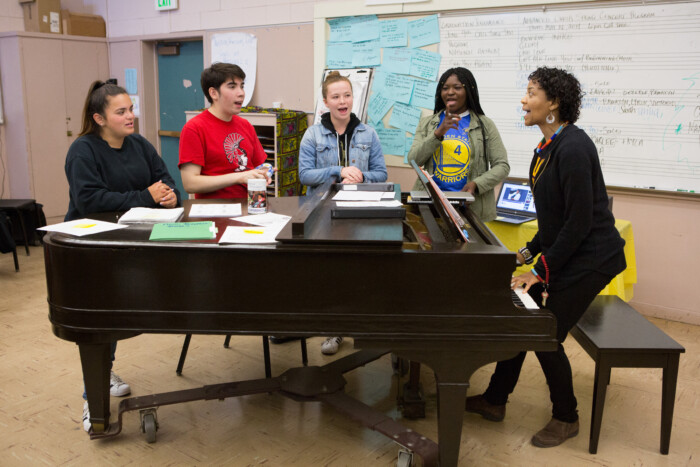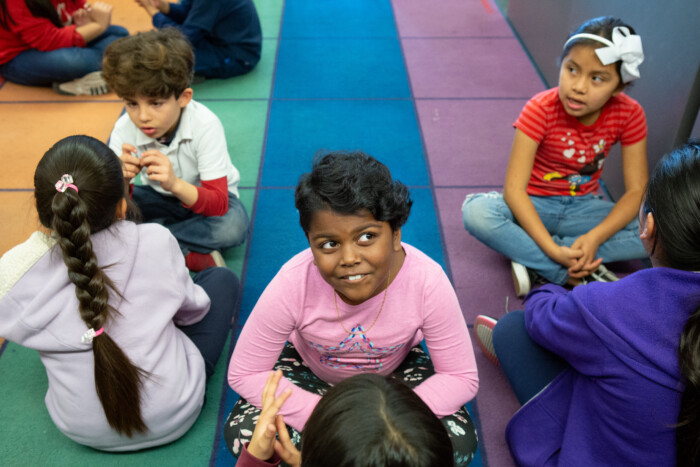Conclusion: Public Microschools Offer A Promising Path Forward
Together, the strategies in this playbook form a practical roadmap for launching public microschools with purpose, clarity, and community at the center. While each design element stands on its own, they are most powerful when approached as a connected process that honors your microschool’s unique vision and contributes to a broader transformation in how public schools can serve students.
Public microschools offer a powerful way forward—not as a departure from public education, but as a way to reimagine it from within. At a time when traditional structures are struggling to meet the moment, microschools provide public school systems with the freedom and flexibility to design learning environments that are personalized, purposeful, and deeply connected to their communities.
Public microschools are not about serving a select few; they are about serving everyone. When designed with intention, they expand opportunity by centering the learner experience, empowering educators, and aligning education with the realities of today’s world. They create space for relevance, agency, belonging, and innovation. While public microschools are intentionally small, their reach can extend across the system. Microschools demonstrate what’s possible when public education systems are trusted with the freedom to innovate and supported in doing so with care and integrity. The promise of public microschools lies not only in the powerful experiences they create for students and educators but in their ability to catalyze broader transformation across the system.
Acknowledgments
This playbook was made possible through generous support from the Walton Family Foundation, which funded this project through the Getting Smart Collective.
Deep thanks to the leadership and team members from Getting Smart Collective, Learner-Centered Collaborative, and Transcend, whose combined contributions reflect decades of commitment to the future of learning and a shared belief in the power of microschools as a transformative strategy within public education systems. We are also grateful to The University of Tulsa for their partnership and ongoing commitment to advancing learner-centered learning. The engagement, thought leadership, and commitment of these organizations were critical to this collaborative effort. Contributors include:
Getting Smart Collective: Tom Vander Ark, Nate McClennen, Victoria Andrews, Jordan Luster, Caroline Vander Ark, and Mason Pashia
Learner-Centered Collaborative: Katie Martin, Devin Vodicka, Bryanna Hanson and Jesse Ross
Transcend: Deborah Gist, Caitlin Keryc, Cynthia Leck, Ross Lipstein, and Jeff Wetzler
This playbook reflects a collective effort to support system leaders who are working to make powerful, learner-centered education available to more students, families, and communities. We want to recognize the countless educators, students, and system leaders from the schools and networks we’ve had the privilege of working with through our communities of practice and professional learning networks. Their boldness, creativity, and lived experiences are the foundation of this work, and we are honored to learn from them daily. In particular, these educators informed the development of this playbook:
Burbella Learning Academy: Dominique Burgess
Cheney Public Schools: Kelley Niccolls
Collegiate Edu-Nation: Rachel McClain
Creation Acre Academy: Jasmine Williams
Discovery Fusion: Christy Aymami
Eastern Hancock Schools: George Philhower
Edge, Liberty Public Schools: Jeremy Tucker
Enhanced Learning Center Cooperative: Leslie Southerland
Escondido Unified School District: Sharill Cortez, Dannie Hampshire, Bryanna Norton
Hazlehurst City School District: Cloyd Garth
Insight Colearning Center: Susan Haws
Issaquah School District: Julia Bamba, Heather Tow-Yick
Khan Lab School: Kimberly Dow
Lamont Elementary School District: Lori Gonzalez, Gloria Moreno, Kyle Pruitt
Mineola Public Schools (Synergy @Mineola): Mike Nagler
Mysa Schools: Bb Ntsakey
One Stone: Celeste Bolin
Open Way Learning: Jimmy McCue
Powderhouse Studios: Alec Resnick
Purdue Polytechnic High School Lab School: Lacey Beatty
Puget Sound Educational Service District 121: Kevin Ikeda
RootED: Casey Hitchcock
San Diego Unified School District: Melissa Agudelo, Stephanie Brown
Surf Skate Science: Toni Frallicciardi
The Ferguson School: Tiffany Blassingame
The Learning Lounge: Kanesha Adams
The Learning Outpost: Felicia Wright
Victory Creative Learning: Kendra Eboigbodin
Virtual Village: LaRon Martin
Wildflower Schools: Matthew Kramer
We are also grateful to reviewers and thought partners who generously provided feedback and insight at various stages of the development process, including Scott Bess, Erica Chapman, Karen Hawley Miles, Babak Mostaghimi, Meredith Olson, Jorge Robles, Chris Rush, Kim Smith, and Eric Wearn. We extend a special thanks to Thomas Arnett of the Clayton Christensen Institute, whose ongoing engagement and feedback helped shape key elements of this playbook. We are also grateful to George Justice, Provost at The University of Tulsa, for his steadfast support of this work and his commitment to advancing learner-centered education through higher education partnerships.
Special appreciation to the editors, writers, and collaborators who ensured this playbook reflects the shared expertise and diverse perspectives of all three partner organizations. Our first draft was written by Deborah Gist with Caitlin Keryc. As our organizations came together with contributions across teams, Carri Schneider brought deep care to the language and structure, ensuring that the playbook remained grounded in both aspiration and practical guidance as editor.
The images in this digital version are used courtesy of Liberty EDGE, The Forest School: An Acton Academy and Institute for Self Directed Learning, KM Global in Kettle Moraine, WI, Arcadia Unified School District Lab School, Issaquah Public Schools, Shidhulai Swanirvar (floating schools) and the All4ED Image Library.
To the reader, thank you for your commitment to reimagining what’s possible. We invite you to keep learning, keep sharing, and stay connected as part of a growing community dedicated to empowering students and transforming systems.


